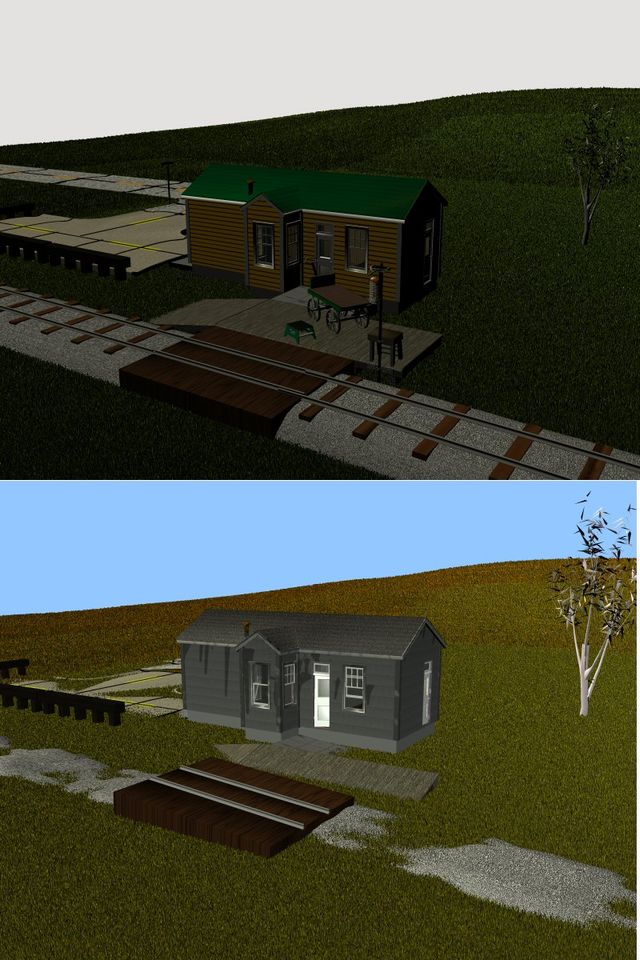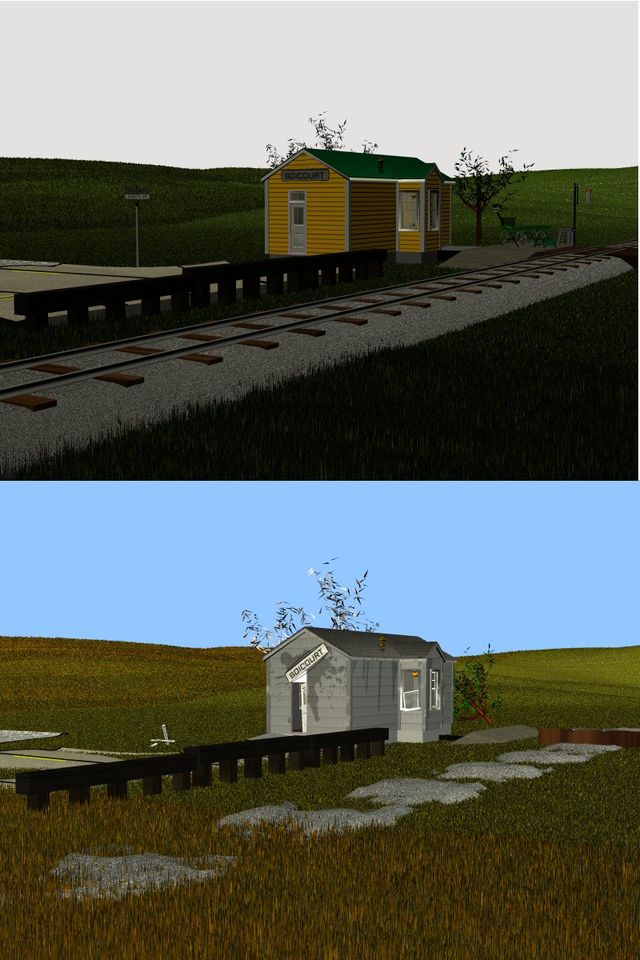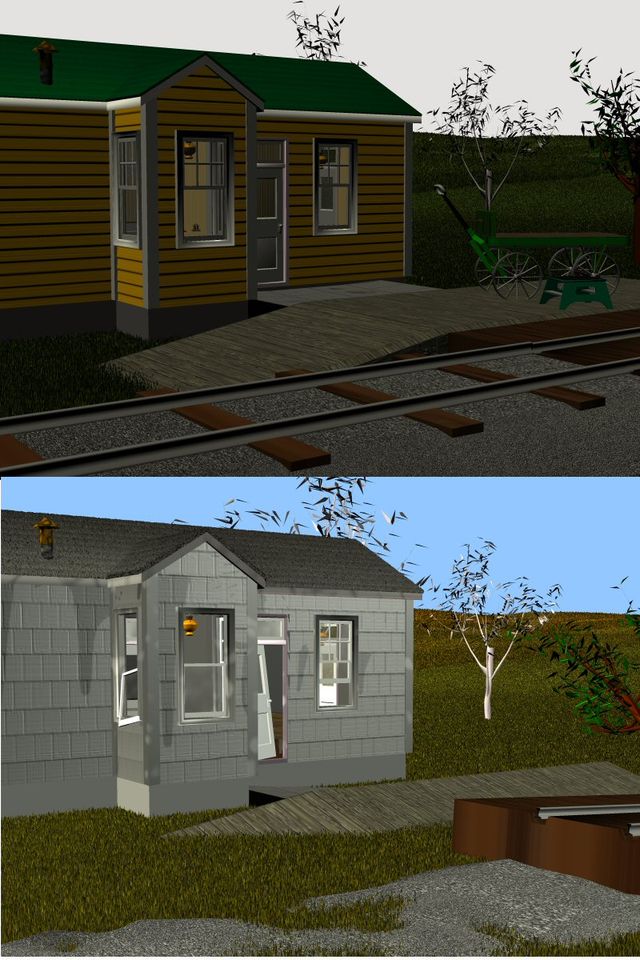Monday, October 29, 2018
Elontropy
I'm nearing the finish and release point on this set of 'lonely railways', inspired by the photos of Howard Killam. The originals were all abandoned and decaying when the pics were taken in the 1950s.
In the digital world it's easy to make clean and new things with straight lines and euclidean polygons.
In Digitalia, strict order is natural and entropy takes REAL WORK.
Well-designed digital objects have smooth surfaces and a minimum number of bendable points. Adding entropy often means a complete rebuild of the object with more wiggleable pieces, and complicated repainting of the surfaces.


 = = = = =
Nature works the other way around. Chaos is the default. Order takes REAL WORK and constant maintenance. Life has to consume a constant supply of unordered chemicals and poop out a constant supply of different unordered chemicals, in order to fight the unending battle against chaos.
= = = = =
Elon and his evil cohorts grew up in the digital world of pure math. They were able to steal tremendous amounts of money by playing in the pure math world of the stock racket. When Elon started building REAL OBJECTS he was shocked by entropy, and he still hasn't figured it out. Maintenance and quality control are NOT part of his mental universe. Software doesn't fall apart when it goes through a puddle. Software doesn't kill anyone when it misconstrues a cement wall.
Older industrialists who started out as mechanics or salesmen grew up with a real-world understanding of entropy. Mechanics know that surfaces wear down and rust and rot and wobble, and they learn through years of experience how to fix and maintain devices to prevent entropy. Salesmen understand the rust and rot and wobble of human emotions, and they learn through years of experience how to fix and maintain a sales relationship ... which often requires calling in a mechanic.
= = = = =
Nature works the other way around. Chaos is the default. Order takes REAL WORK and constant maintenance. Life has to consume a constant supply of unordered chemicals and poop out a constant supply of different unordered chemicals, in order to fight the unending battle against chaos.
= = = = =
Elon and his evil cohorts grew up in the digital world of pure math. They were able to steal tremendous amounts of money by playing in the pure math world of the stock racket. When Elon started building REAL OBJECTS he was shocked by entropy, and he still hasn't figured it out. Maintenance and quality control are NOT part of his mental universe. Software doesn't fall apart when it goes through a puddle. Software doesn't kill anyone when it misconstrues a cement wall.
Older industrialists who started out as mechanics or salesmen grew up with a real-world understanding of entropy. Mechanics know that surfaces wear down and rust and rot and wobble, and they learn through years of experience how to fix and maintain devices to prevent entropy. Salesmen understand the rust and rot and wobble of human emotions, and they learn through years of experience how to fix and maintain a sales relationship ... which often requires calling in a mechanic.


 = = = = =
Nature works the other way around. Chaos is the default. Order takes REAL WORK and constant maintenance. Life has to consume a constant supply of unordered chemicals and poop out a constant supply of different unordered chemicals, in order to fight the unending battle against chaos.
= = = = =
Elon and his evil cohorts grew up in the digital world of pure math. They were able to steal tremendous amounts of money by playing in the pure math world of the stock racket. When Elon started building REAL OBJECTS he was shocked by entropy, and he still hasn't figured it out. Maintenance and quality control are NOT part of his mental universe. Software doesn't fall apart when it goes through a puddle. Software doesn't kill anyone when it misconstrues a cement wall.
Older industrialists who started out as mechanics or salesmen grew up with a real-world understanding of entropy. Mechanics know that surfaces wear down and rust and rot and wobble, and they learn through years of experience how to fix and maintain devices to prevent entropy. Salesmen understand the rust and rot and wobble of human emotions, and they learn through years of experience how to fix and maintain a sales relationship ... which often requires calling in a mechanic.
= = = = =
Nature works the other way around. Chaos is the default. Order takes REAL WORK and constant maintenance. Life has to consume a constant supply of unordered chemicals and poop out a constant supply of different unordered chemicals, in order to fight the unending battle against chaos.
= = = = =
Elon and his evil cohorts grew up in the digital world of pure math. They were able to steal tremendous amounts of money by playing in the pure math world of the stock racket. When Elon started building REAL OBJECTS he was shocked by entropy, and he still hasn't figured it out. Maintenance and quality control are NOT part of his mental universe. Software doesn't fall apart when it goes through a puddle. Software doesn't kill anyone when it misconstrues a cement wall.
Older industrialists who started out as mechanics or salesmen grew up with a real-world understanding of entropy. Mechanics know that surfaces wear down and rust and rot and wobble, and they learn through years of experience how to fix and maintain devices to prevent entropy. Salesmen understand the rust and rot and wobble of human emotions, and they learn through years of experience how to fix and maintain a sales relationship ... which often requires calling in a mechanic.Labels: Morsenet of Things, skill-estate
